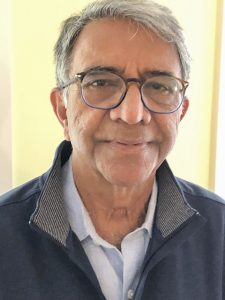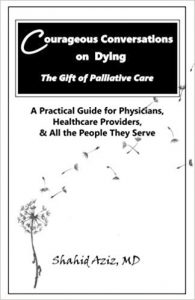
 Do you have a few minutes to talk about your death?
Do you have a few minutes to talk about your death?
Dr. Shahid Aziz hopes so.
With over 20 years of experience in pediatrics, medical management, hospice and palliative medicine, Aziz knows the “D-word” is something no one wants to address.
“There’s a lot of hesitancy,” he said. “People don’t want to do it, doctors don’t want to do it.”
When he served as the chair of pediatrics and the ethics committee at MedStar Harbor Hospital in Baltimore, he saw firsthand how this avoidance leads to unnecessary pain when questions about end-of-life care arise.
“All the (ethical) consultation had to do with the end of life, and decision-making at the end of life,” he said, “which is a hard thing for families and patients.”
The realization that patients and doctors alike need a better protocol for discussing the end of life led Aziz to start giving seminars called “Courageous Conversations on Death and Dying: The Time is Now,” which he held at Chautauqua for the first six weeks of this season as part of the Department of Religion’s programming (representatives from Chautauqua Hospice & Palliative Care led presentations in Weeks Six-Eight). This was Aziz’s fifth year speaking at the Institution.
The ideas outlined in these talks formed the basis of his book, Courageous Conversations on Dying: The Gift of Palliative Care, which came out last year.
Aziz will be signing copies of Courageous Conversations on Dying at 12:30 p.m. Wednesday, August 21 in the Author’s Alcove of the Chautauqua Bookstore.
The advancements of modern medicine have raised new ethical questions about how medical professionals should act in end-of-life situations.
“What happens is, somebody gets really sick … (or) they’re on medicines or machines of some sort,” Aziz said. “If we are helping prolong someone’s life by artificial means, (then) the ethical question is: Is the patient living what they think is a meaningful life?”
He said the way to take this question out of the hands of doctors or grieving family members is to have conversations outlining a person’s minimum meaningful quality of life before it’s too late to ask.
“All I need to know is, what is your minimum acceptable level of living that you would say is meaningful to you?” Aziz said. “Then, if you cannot make your decisions, for whatever reason you have lost your capacity to make decisions, … if we know what is important to you at a minimum level, then we know we can try and help you to get there. And if we cannot, then we know we can stop all treatment and let you just go in peace, because forcing you to live a life you don’t (want) — that would be unethical.”
Courageous Conversations on Dying is meant to be a resource for physicians and health care providers, as well as their patients. Aziz said he took care to write the book in easy-to-read, engaging language.
According to Aziz, current advance health care directives are overly complicated, and focus too much on listing medical procedures without asking questions about quality of life. These forms are often eight or nine pages long and include questions about thousands of potential treatments.
“I’ve boiled it down to three questions,” he said. “I’ll ask you three questions, and I’ll know exactly what you want.”
Aziz asks patients to identify the minimum level of mental awareness and physical functioning that is acceptable for them to have a meaningful life; to outline any life-prolonging treatments they wish to use or not use, and why.
“In the end, you or your family will be at peace that the right things are being done … and will have reasons to understand why they are being done,” he said, “So it’s not an emotional decision, it is a rational decision. That’s sort of my job; to help you make good, rational decisions and be at peace.”
Aziz said that although it is important to get this information written down so it can be given to medical professionals, the possible intimidation some might feel about creating an official document shouldn’t discourage people from talking about death with their families.
“The more important thing is this conversation, not the document,” he said. “The document is a close second, (but) you cannot, not have the conversation because you’re not ready yet to sign the paper.”
Aziz has been encouraged by how receptive Chautauquans have been to his talks. He hopes his book and the continuation of his seminars will help his message reach even more people.
“We all have to go through this, (so) let’s plan for a journey that we’re absolutely going to take,” he said. “(Let’s talk about) how to live the life you want to live and hopefully die as close to the way you want to die, and not be stuck in between.”




